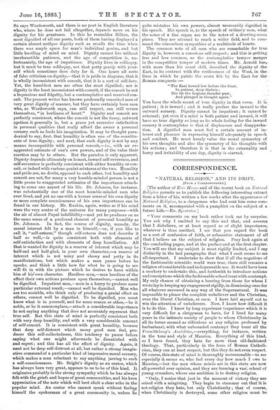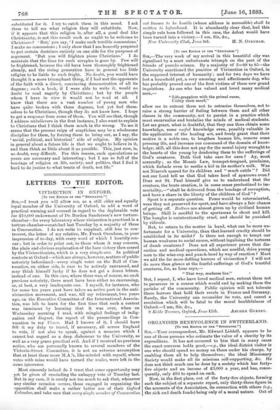CORRESPONDENCE.
"NATURAL RELIGION," AND ITS DRIFT. [nom A CORRESPONDRNT.]
[The author of Ecce Homo and of the recent book on Natural Religion permits us to publish the following interesting extract from a letter of his, written a few weeks after the appearance of Natural Religion, to a clergyman who had sent him some com- ments on it, accompanied with a pamphlet on the subject of a future Life.—En. Spectator.]
"Your comments on my book rather took me by surprise. You ask why I omitted to say this and that, and assume that I disbelieve, or at least regard as of slight importance, whatever is thus omitted. I see that you regard the book as a sort of confession of faith, or exhaustive statement of all that I believe on the subject of religion. Pray look again at the concluding pages, and at the preface and at the first chapter. You will see that my subject is most rigidly limited, and I say distinCtly in the last paragraphs that what I omit seems to me all-important. I undertake to show that if all the negations of the fashionable scientific world were true, there still remains a religion of considerable and indispensable use. It would have been a mockery to undertake this, and forthwith to introduce notions and conceptions which the fashionable school treat with contempt. My only chance of obtaining a hearing from those for whom I wrote layin keeping my engagement rigidly, in dismissing once for all whatever savoured in any way of the Supernatural. It was impossible to please the complete unbeliever and the Christian, even the liberal Christian, at once. I have laid myself out to win the attention of unbelievers. Now, I know how difficult it is to do this. I know by long experience (experience which it is very difficult for a clergyman to have, for I lived for many years in the intimate society of people to whom Christianity in all its forms seemed as ridiculous as any religion professed by barbarians), with what unbounded contempt they treat all the Vermittelung's Ansichten,—everything, for instance, written in the tone and style of Maurice. Everything of this kind, so I have found, they hate far more than old-fashioned ' theology. That, particularly in the form of Roman Catholi- cism, they can at least respect, but this they do not even respect. Of course, this state of mind is thoroughly unreasonable—to me especially it seems so, who feel every day how much I owe to Maurice,—but the men whose minds are in this state are now all-powerful over opinion, and they are forming a VEL8C school of young crusaders, whose one ambition is to destroy religion.
"Only, I notice that just in the moment of victory they are seized with a misgiving. They begin to stammer out thatit is not religion they hate, bat only Christianity ; that • of course, when Christianity is destroyed, some other religion must be substituted for it. I try to catch them in this mood. I ask them to tell me what religion they will substitute. Now, if it appears that this religion is, after all, a good deal like Christianity, is not this result such as ought to be welcome to Christians? But,' you say, I make such terrible concessions.' I make no concessions ; I only show that I am honestly prepared to put certain doctrines entirely on one side for the purposes of argument. 'But you will frighten pious Christians.' I do maintain that the time for such scruples is gone by. Few will be frightened, because the old have been thoroughly frightened already, and the rising generation have in general too little religion to be liable to such fright. No doubt, you would have thought it a more triumphant thing, if I had met the opponents of the faith with a direct, convincing demonstration of all its dogmas ; such a book, if I were able to write it, would no doubt be read eagerly by Christians ; but by the people whom I have in view it would not be read at all. I know that there are a vast number of young men who have quite broken with these dogmas, but yet feel them- selves to be Christians, though they do not know how. I hope to get a response from some of them. You will see that, though I address unbelievers in the first instance, I also want to explain to Christians that I think them much in the wrong. To me it seems that the present reign of scepticism may be a wholesome discipline for them, by forcing them to bring out, as I say, the social, political, and historical' side of religion. My opinion in general about a future life is that we ought to believe in it, and then think as little about it as possible. This, just now, is, no doubt, very difficult. For this reason, such speculations as yours are necessary and interesting ; but I am so full of the bearings of religion on life, society, and politics, that I find it hard to do justice to what treats of death, not life."



































 Previous page
Previous page